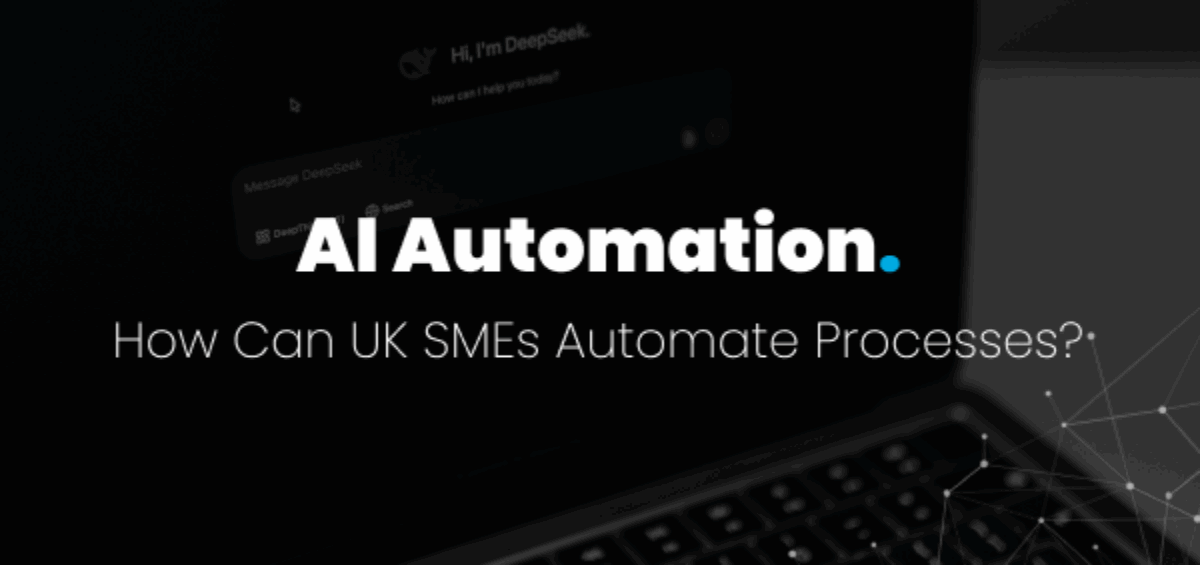From reducing human error to freeing up teams for higher-value work, automation is helping businesses move faster, deliver better, and grow smarter.
More than a quarter of UK businesses have already embraced IT automation across their operations. With 27% achieving enterprise-wide automation and another 29% actively working toward it, the shift to AI automation is inevitable.
As adoption rises, the UK is positioning itself at the forefront of tech-enabled productivity and long-term economic strength. In this guide, we explore how AI can automate processes for UK businesses and what that transformation looks like in practice for the British commercial landscape.
What Is AI-Powered Automation?
AI-powered automation refers to the use of artificial intelligence technologies to perform tasks without human intervention. It combines tools such as machine learning, natural language processing, and computer vision to complete complex tasks that traditional automation cannot handle.
Instead of following fixed scripts, AI systems can learn from data and adjust their responses based on new information. That means they can handle things like analysing trends, answering customer questions, or detecting issues in machinery with far greater flexibility and speed than manual methods.
Whether it’s a chatbot solving customer queries or software preventing equipment failure in a factory, the system gets better the more it’s used.
AI is also proven successful in boosting employee productivity. According to Accenture, AI can increase productivity by up to 40% by 2035. That’s a lot of saved time, the room to grow faster, serve better, and stay ahead of the curve.
How AI Can Automate Processes for UK Businesses
AI is reshaping how UK businesses operate by automating tasks that were previously dependent on manual input. Here’s how:
1. Processing Invoices and Financial Records
Traditionally, finance teams have to manually review invoices, input figures into spreadsheets, cross-check payment dates, and chase down errors. This process is slow and prone to mistakes, especially under pressure.
AI automation reads invoices, extracts key data like due dates and amounts, and automatically updates financial records. It flags unusual charges and even processes payments on schedule.
According to the Bank of England, 75% of UK financial services firms now utilise AI to streamline these tasks. For example, at Communicorp UK, payroll processing used to take up to two full days. After introducing AI to automate time-tracking and wage calculations, that same job now takes just one hour. This means less admin, fewer errors, and more time for strategic finance work.
2. Responding to Customer Questions
Customer service teams once handled every query manually, whether it was asking for a password reset or tracking an order. Agents became overwhelmed with repetitive issues, resulting in long wait times.
Chatbots now answer routine queries instantly. AI triages support tickets based on urgency, topic, or sentiment. This frees human agents to focus on complex problems that need empathy and deeper understanding.
Vodafone UK utilises a chatbot called TOBi, which currently handles 25 to 30 million conversations per month with customers. It resolves around 70% of queries without human assistance, enabling Vodafone to deliver faster service while reducing the load on its support team.
3. Predicting Equipment Failure in Operations
Engineers rely on scheduled maintenance or wait until equipment breaks down. This results in unexpected downtime and costly emergency repairs.
When it comes to automation, sensors feed data into AI models that predict when an issue will occur before it happens. This enables maintenance teams to resolve problems promptly and prevent disruptions from occurring.
Rolls-Royce uses AI to monitor aircraft engines in real-time. The system can detect small signs of failure 60% faster than traditional methods, thereby reducing delays and ensuring planes run safely and efficiently.
4. Hiring and Screening Job Applicants
Recruiters read every CV, shortlist candidates, schedule interviews, and manage onboarding paperwork. This process can take weeks, especially when hundreds of applicants compete for a single role.
AI tools scan CVs faster than any recruiter. They match candidates to roles, schedule interviews, and reduce bias by focusing on skill over keywords.
Unilever relies on AI to screen over 1.8 million job applications annually. Their tool evaluates video interviews using natural language processing and facial cues.
It saves the company 70,000 hours and provides every candidate with personalised feedback, which recruiters can’t manage manually.
5. Sorting Through Legal Documents
When discussing legal documents, teams must review pages of contracts, HR policies, or compliance rules. It takes hours, especially when looking for a single clause or condition.
Introducing AI automation tools can summarise lengthy PDFs, highlight key points, and even answer questions based on the document’s content, saving hours of manual reading.
One practical use case scenario is JPMorgan Chase’s AI system. This system can instantly summarise financial contracts and reports for over 50,000 employees, providing them with insights without requiring them to dig through dozens of pages.
The Size and Economic Impact of the UK AI Sector
The UK’s AI sector is expanding fast. AI is no longer limited to major tech businesses.
Over 3,000 AI companies now operate nationwide, generating more than £10 billion each year. These businesses employ over 60,000 people, forming a core part of the UK’s digital economy.
From London to Cambridge, AI is fueling job growth and innovation across industries. More importantly, it’s now accessible to small and medium-sized enterprises as well.
Businesses in the UK spent £16.7 billion on AI in 2020, a figure expected to double to over £30 billion by the end of 2025. Many SMEs are turning to affordable tools, such as automated bookkeeping, inventory tracking, and AI chatbots.
These solutions cut costs, reduce errors, and free up teams for more strategic work. As adoption rises, AI is becoming not just a growth driver but a competitive necessity across sectors like finance, healthcare, and manufacturing.
Secure Business Growth in the UK With AI Automation
From managing customer service to improving cash flow and reducing operational costs, AI is already helping businesses across the UK scale faster and run more efficiently.
If you’ve been wondering how AI can automate processes for UK businesses, the answer is Rejuvenate IT. We guide companies through this transition with expert support and proven tools.
Our team ensures your systems are secure, connected, and built to grow with you. Call 01202 237 273 or email [email protected] today and take the first step toward AI automation.











